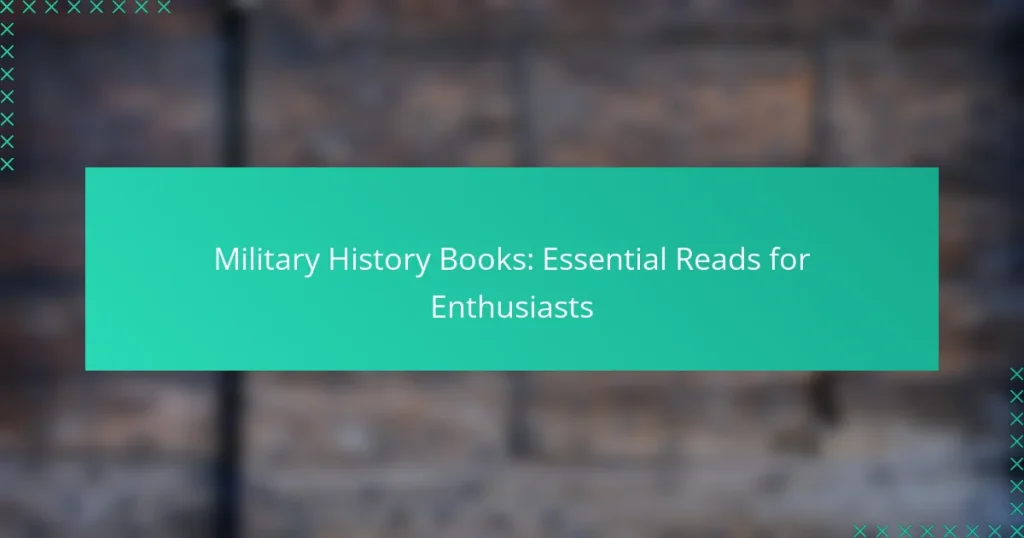For military history enthusiasts, a selection of essential reads offers profound insights into key conflicts, strategies, and the development of warfare. By exploring various genres such as biographies, battlefield accounts, and strategic analyses, readers can deepen their understanding of the complexities of military history. Choosing the right books involves considering historical periods of interest and evaluating the credibility of authors, ensuring an enriching reading experience.
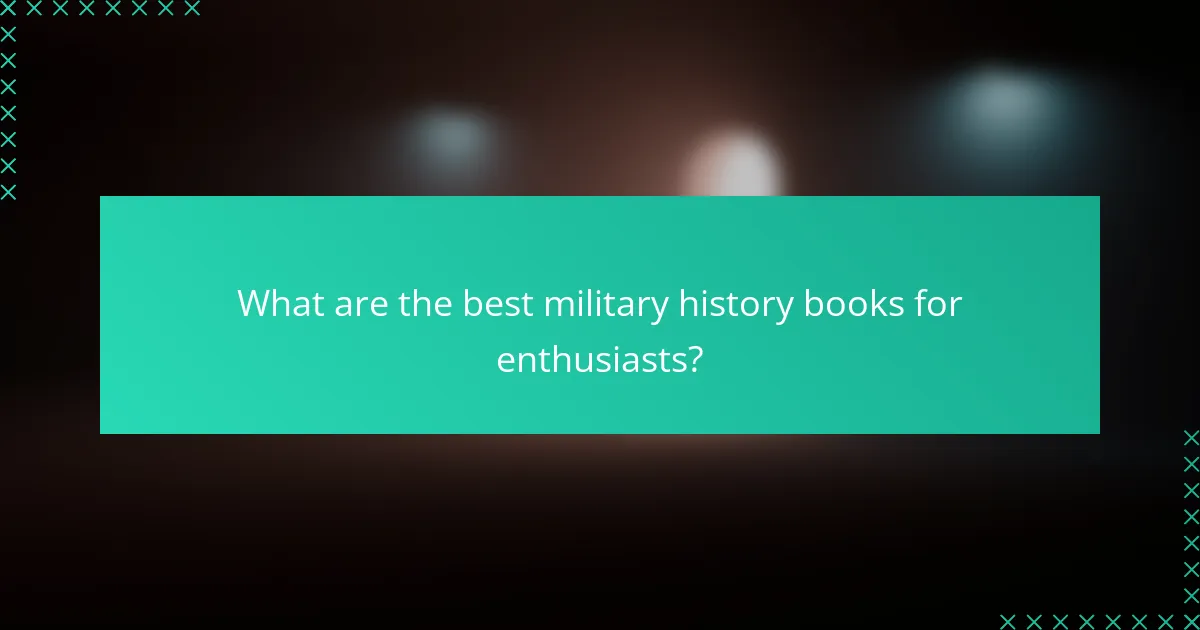
What are the best military history books for enthusiasts?
For military history enthusiasts, several books stand out as essential reads. These works provide deep insights into pivotal conflicts, strategies, and the evolution of warfare, making them invaluable for anyone interested in the subject.
“The Guns of August” by Barbara W. Tuchman
Barbara W. Tuchman’s “The Guns of August” offers a detailed account of the events leading up to World War I. The book focuses on the first month of the war, highlighting the decisions made by military leaders and their consequences.
Tuchman’s narrative style makes complex military strategies accessible, and her vivid descriptions bring historical figures to life. This book is often praised for its thorough research and engaging storytelling, making it a must-read for those interested in the Great War.
“The Second World War” by Sir Winston Churchill
Sir Winston Churchill’s “The Second World War” is a comprehensive six-volume series that provides an in-depth perspective on World War II from the viewpoint of one of its key leaders. Churchill’s firsthand experience and insights into military strategy and political decisions offer readers a unique understanding of the conflict.
This work is not only a historical account but also a reflection on leadership and resilience during one of history’s most challenging times. Enthusiasts will appreciate Churchill’s eloquent prose and the depth of analysis he provides.
“A History of Warfare” by John Keegan
John Keegan’s “A History of Warfare” examines the evolution of warfare through various cultures and epochs. Keegan challenges traditional narratives by analyzing how social structures and cultural contexts shape military practices.
This book is particularly valuable for readers interested in the broader implications of warfare beyond just battles and tactics. Keegan’s interdisciplinary approach encourages readers to think critically about the relationship between society and military conflict.
“On War” by Carl von Clausewitz
“On War” by Carl von Clausewitz is a foundational text in military theory, exploring the nature and philosophy of war. Clausewitz emphasizes the complexity of war and the interplay between politics and military strategy.
This book is essential for understanding modern military thought, as it introduces concepts such as the “fog of war” and the importance of moral and psychological factors in conflict. Readers looking to grasp the theoretical underpinnings of military strategy will find this work indispensable.
“The Art of War” by Sun Tzu
Sun Tzu’s “The Art of War” is a classic treatise on military strategy and tactics that has influenced both Eastern and Western military thinking. The text emphasizes the importance of strategy, deception, and adaptability in achieving victory.
This book is not only relevant for military leaders but also for business strategists and anyone interested in competitive environments. Its principles, such as knowing oneself and the enemy, remain applicable across various fields today.
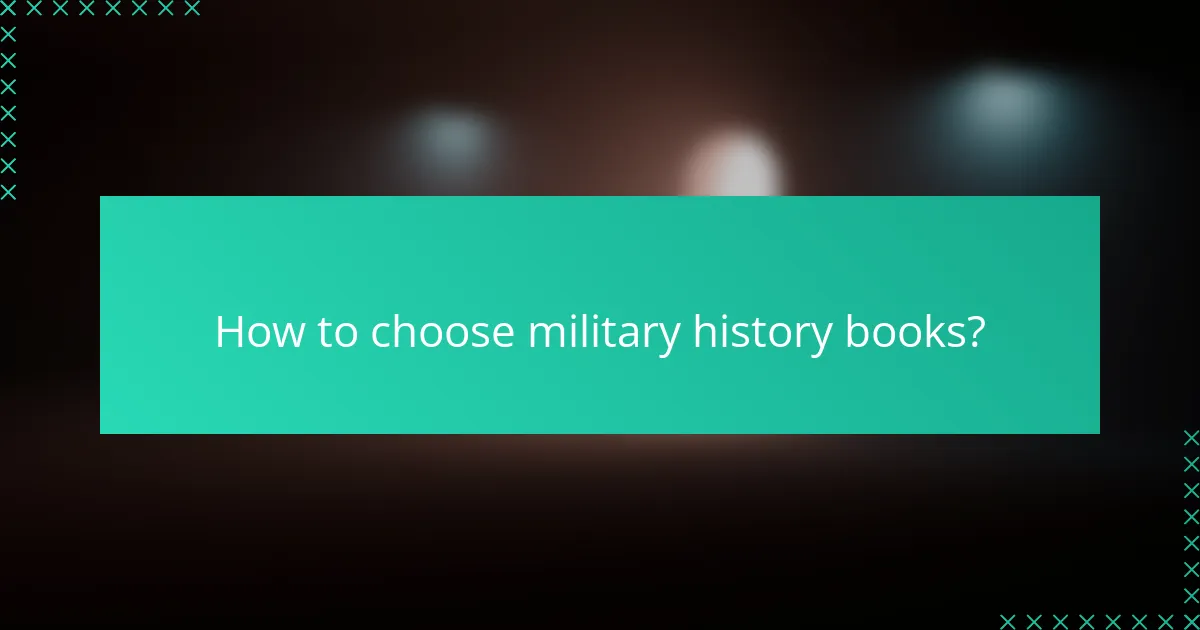
How to choose military history books?
Selecting military history books involves considering the specific historical periods you are interested in, evaluating the credibility of the authors, and checking reader reviews to gauge the book’s reception. These steps will help ensure that you choose informative and engaging titles that enhance your understanding of military history.
Consider historical periods
When choosing military history books, it’s essential to focus on the historical periods that interest you most. Whether it’s ancient warfare, World War I, or modern conflicts, each era has distinct characteristics and themes. Narrowing your focus can help you find books that provide deeper insights into specific events or military strategies.
For example, if you’re fascinated by World War II, look for books that cover various aspects such as battles, political decisions, or personal accounts. This targeted approach allows you to build a comprehensive understanding of the chosen period.
Evaluate author credibility
Assessing the credibility of authors is crucial in military history literature. Look for authors with relevant academic backgrounds, military experience, or extensive research in the field. Established historians or retired military personnel often provide more reliable insights and analyses.
Additionally, consider the author’s previous works and their reception. A well-regarded author in military history is likely to produce quality content. Researching their credentials can help you determine if their perspective aligns with your interests.
Check reader reviews
Reader reviews can offer valuable insights into the strengths and weaknesses of military history books. Platforms like Goodreads or Amazon often feature user ratings and comments that highlight the book’s depth, readability, and overall impact. Pay attention to reviews that discuss the book’s accuracy and engagement level.
Look for patterns in the feedback. If multiple readers mention a book’s thorough research or compelling storytelling, it may be worth considering. Conversely, if reviews frequently cite inaccuracies or lack of depth, it may be best to explore other options.
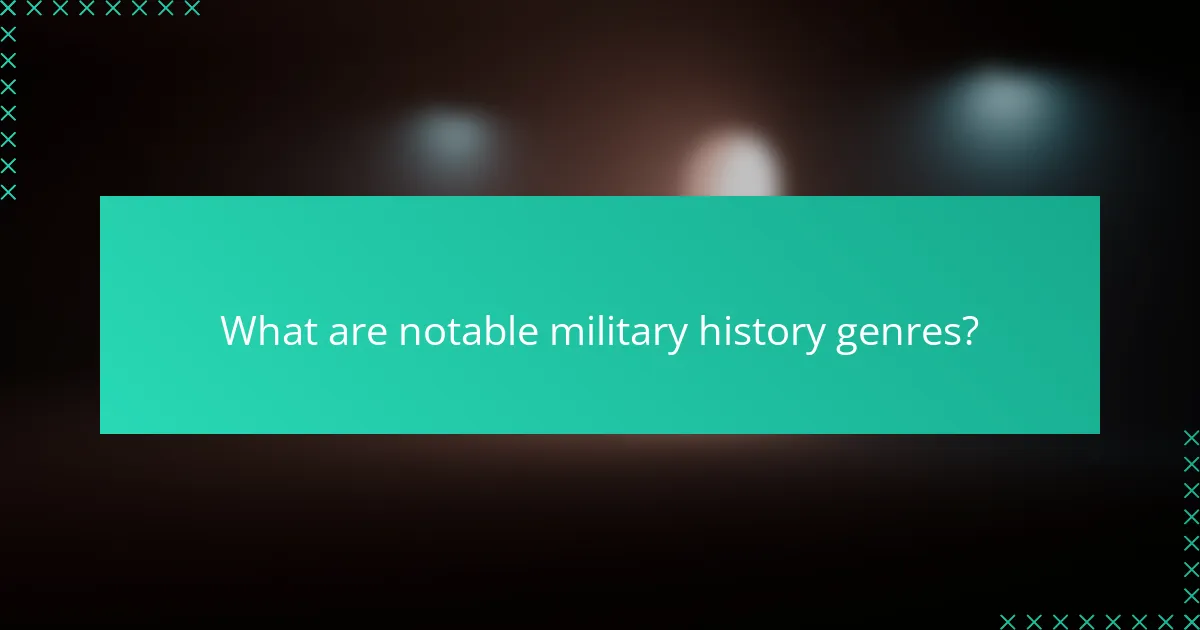
What are notable military history genres?
Notable military history genres include biographies of military leaders, battlefield accounts, and strategic analyses. Each genre offers unique insights into the complexities of warfare, leadership, and military strategy, catering to different interests within the field.
Biographies of military leaders
Biographies of military leaders provide an in-depth look at the lives and careers of influential figures in military history. These works often explore their motivations, decisions, and the impact they had on their respective conflicts.
When reading biographies, consider the author’s perspective and the context in which the leader operated. Notable examples include “Alexander the Great” by Robin Lane Fox and “The Life of Napoleon Bonaparte” by William Milligan Sloane, which highlight the complexities of their subjects.
Battlefield accounts
Battlefield accounts focus on specific battles or campaigns, detailing the experiences of soldiers and commanders during combat. These narratives often provide vivid descriptions of the chaos and challenges faced on the front lines.
Look for firsthand accounts or memoirs, as they can offer personal insights that enrich your understanding of historical events. Books like “All Quiet on the Western Front” by Erich Maria Remarque and “With the Old Breed” by Eugene Sledge are excellent examples that capture the realities of warfare.
Strategic analyses
Strategic analyses examine the broader implications of military actions, including tactics, logistics, and the political landscape. These works often assess the effectiveness of strategies employed during conflicts and their long-term consequences.
When engaging with strategic analyses, consider how different factors such as geography, technology, and leadership influenced outcomes. Titles like “On War” by Carl von Clausewitz and “The Utility of Force” by Rupert Smith provide critical insights into military strategy and its evolution over time.

What are the benefits of reading military history?
Reading military history offers insights into the complexities of warfare, strategy, and leadership. It helps enthusiasts understand the past, learn from it, and apply those lessons to contemporary issues.
Understanding historical context
Military history provides a framework for understanding the social, political, and economic factors that influence conflicts. By studying various wars and battles, readers can grasp how historical events shaped nations and cultures.
For instance, examining the causes and consequences of World War I reveals the intricate alliances and tensions that led to global conflict. This context helps enthusiasts appreciate the nuances of military decisions and their long-term impacts.
Learning from past strategies
Analyzing historical military strategies allows readers to identify successful tactics and common mistakes. By exploring battles like the Normandy Invasion or the tactics used in the Vietnam War, enthusiasts can discern what worked and what didn’t.
Understanding these strategies can inform modern military practices and even business strategies, as many principles of leadership and decision-making are universal. For example, the importance of adaptability in changing circumstances is a lesson that transcends time and context.
Enhancing critical thinking skills
Engaging with military history sharpens critical thinking by challenging readers to evaluate decisions and outcomes. Analyzing the choices made by leaders during pivotal moments encourages a deeper understanding of cause and effect.
Readers can practice critical analysis by questioning why certain strategies failed or succeeded. This skill is transferable to various fields, fostering a mindset that values evidence-based reasoning and informed decision-making.
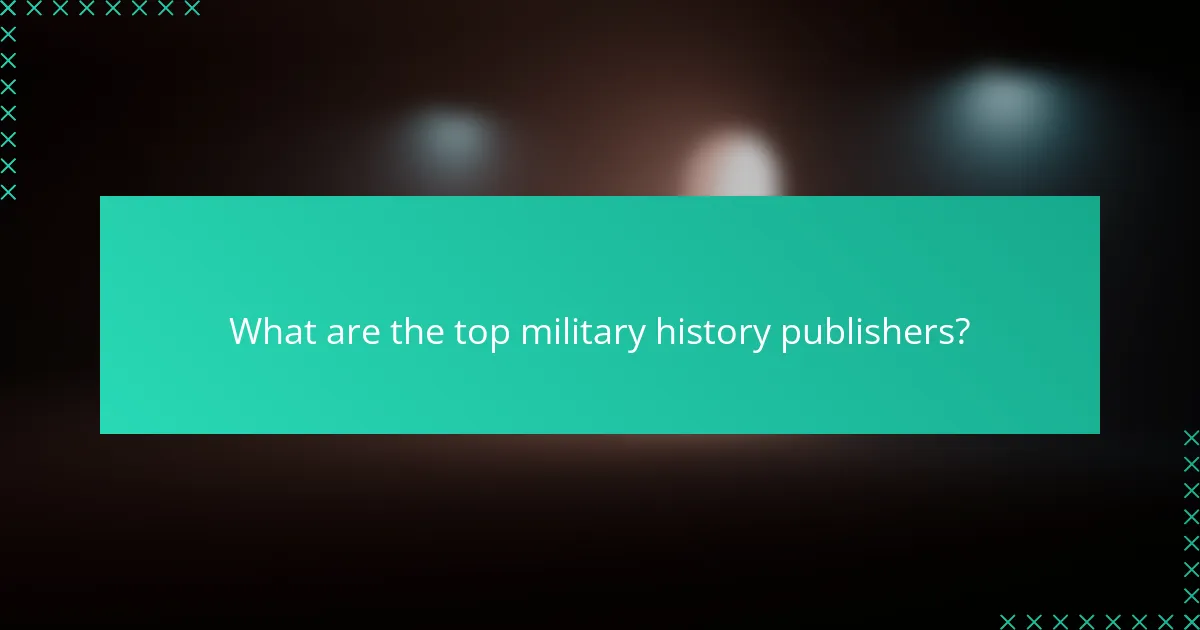
What are the top military history publishers?
The leading military history publishers are known for their extensive catalogs and commitment to quality. These publishers produce a wide range of titles that cover various aspects of military history, making them essential resources for enthusiasts.
Penguin Random House
Penguin Random House is a major player in the publishing industry, offering a diverse selection of military history books. Their catalog includes both classic works and contemporary analyses, appealing to a broad audience.
Notable titles often explore significant wars, military strategies, and biographies of influential military leaders. Their books are typically well-researched and accessible, making them suitable for both casual readers and serious scholars.
HarperCollins
HarperCollins is recognized for its strong lineup of military history publications. They focus on narrative-driven accounts that bring historical events to life, often featuring firsthand accounts and detailed analyses.
This publisher frequently collaborates with respected historians and military experts, ensuring that their titles are both informative and engaging. Readers can find books covering various conflicts, from ancient battles to modern warfare.
Oxford University Press
Oxford University Press is renowned for its scholarly approach to military history. Their publications often include comprehensive studies and critical analyses, making them a go-to source for academic research.
With a focus on rigorous scholarship, their titles are ideal for those seeking in-depth understanding of military events and theories. They also publish reference materials that are valuable for students and professionals in the field.
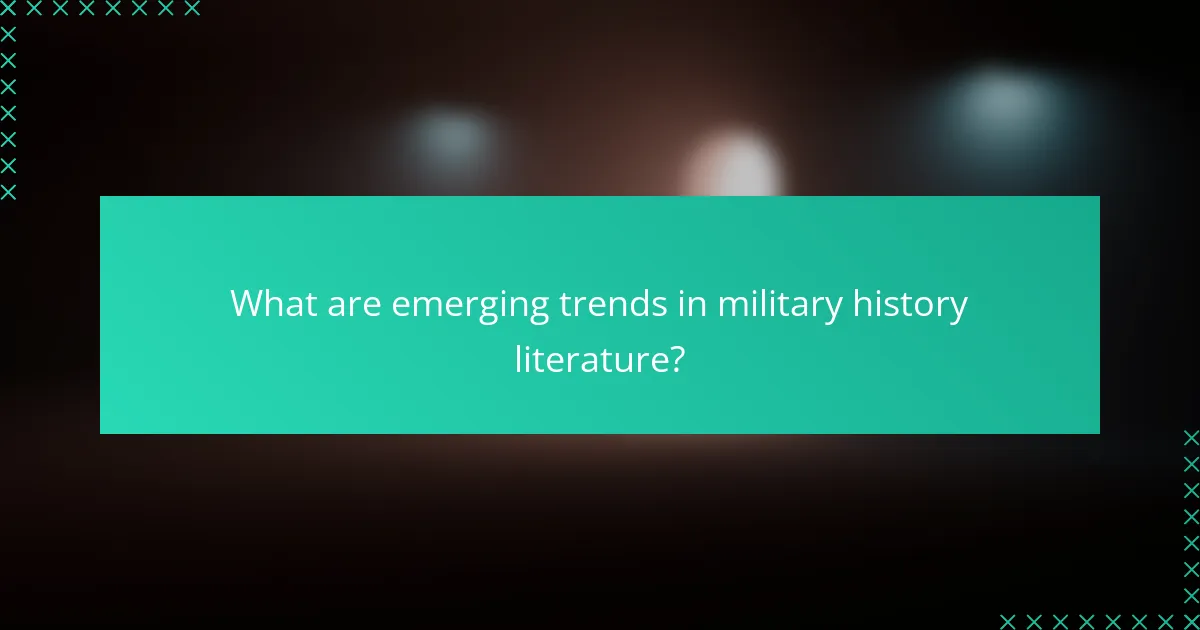
What are emerging trends in military history literature?
Emerging trends in military history literature reflect a shift towards more diverse narratives and interdisciplinary approaches. Authors increasingly focus on underrepresented perspectives, including those of women, minorities, and non-combatants, while integrating insights from sociology, psychology, and cultural studies.
Increased Focus on Personal Narratives
Recent military history books often emphasize personal stories and memoirs, providing intimate insights into the experiences of soldiers and civilians. This trend allows readers to connect emotionally with historical events, moving beyond traditional military tactics and strategies.
Books like “The Things They Carried” by Tim O’Brien exemplify this approach, blending fiction and memoir to convey the psychological impact of war. Such narratives help readers understand the human side of conflict, fostering empathy and deeper comprehension.
Interdisciplinary Approaches
Military history is increasingly intersecting with other fields, such as psychology, sociology, and political science. This interdisciplinary approach enriches the analysis of warfare by examining the social dynamics, cultural contexts, and psychological effects of conflict.
For instance, works that explore the mental health implications of combat, such as PTSD, provide valuable insights into the long-term consequences of war. This trend encourages a broader understanding of military history, moving beyond mere dates and battles.
Global Perspectives
There is a growing emphasis on global perspectives in military history literature, highlighting conflicts outside the Western narrative. Authors are exploring wars in Asia, Africa, and Latin America, offering a more comprehensive view of military history.
Books that focus on the Vietnam War from Vietnamese perspectives or the impact of colonialism on military conflicts illustrate this trend. By incorporating diverse viewpoints, readers gain a richer understanding of how global events shape military history.
Digital and Interactive Formats
With advancements in technology, military history literature is increasingly available in digital and interactive formats. E-books, podcasts, and online documentaries provide new ways for enthusiasts to engage with historical content.
These formats often include multimedia elements, such as maps and timelines, enhancing the learning experience. Readers can explore complex historical narratives in a more accessible and engaging manner, making military history more appealing to a wider audience.
